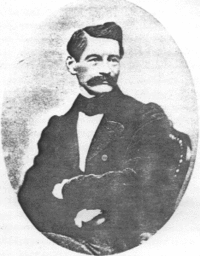Theodor von Zwehl
Theodor Karl Johann Nepomuk von Zwehl (born February 7, 1800 in Vallendar ; † December 17, 1875 in Munich ) was Bavarian State Minister of the Interior (1849–1864) and President of the Government Districts of Upper Bavaria (1848–1849, 1870–1875) and Upper Franconia ( 1864–1868?).
Childhood and career start
Theodor von Zwehl lost his parents in early childhood and therefore spent his youth with relatives in Salzburg , Munich and Würzburg . In 1818 he graduated from high school in Würzburg with very good grades and studied law in Würzburg and Heidelberg . During his studies in 1818 he became a member of the old Würzburg fraternity Germania , later fraternity Germania zu Würzburg . After the fraternities were banned, Zwehl came into conflict with the Bavarian authorities in 1824 and was temporarily banned from studying, but was pardoned after a year. In 1826 he passed the legal state examination and in 1831 was appointed to the State Ministry of the Interior as an unskilled worker. After further promotions, Zwehl took over the State Ministry of the Interior for Church and School Affairs in 1849 as " March Minister", where he remained in office for almost three and a half years until 1852 . During this tenure, Zwehl took a significant part in the legislative work on provisions such as the law on assemblies and associations , the law against abuse of the press , the law on hunting on foreign soil and other important laws.
Time in the Ministry of Church and School Affairs
On December 1, 1852, Zwehl took over the ministry for church and school affairs, after having been provisionally managing it alongside that of the interior since June 1851. Despite sharp criticism for the lack of “the full clarity of goals” and “the desirable energy in combating elements that hinder the interests of the state” (for example, in 1854 he still had concerns about appointing non-Catholics as history professors) one finds significant achievements from his term of office. For example, a law was passed that strengthened the community's duties towards elementary schools and teachers, improved the learning content and placed it on a solid foundation, and created a pension system for the “ elementary school teachers ” (November 10, 1861). In 1861 the University of Erlangen awarded Zwehl a doctorate in law ; as district president, Zwehl later set up the first canteen at Erlangen University.
District President and honorary citizen of Bayreuth
In 1864 Zwehl was transferred to Bayreuth as district president . During this term of office, which lasted until September 3, 1868, the Prussian occupation fell in 1866. During this critical time, Zwehl managed to spare the city of Bayreuth from hardships by representing the interests of the province with prudence and energy and by his demeanor. For this achievement Zwehl was honored as an honorary citizen of the city of Bayreuth on September 25, 1866 . Rinderpest first appeared in Europe during this term of office . He left Bayreuth on September 3, 1868 and accepted a government post in Augsburg , where it only held him for two years. Then he moved to the regional council in Munich . Here, too, as before in the Ministry of Church and School Affairs, he led school reforms. He remained in office until his death on December 17, 1875. After his death, his children built a stone bench with a memorial plaque on the Stadlberg near Miesbach . Zwehl often spent his summers in Miesbach.
literature
- Werner K. Blessing : Zwehl, Theodor von. In: Karl Bosl (ed.): Bosls Bavarian biography. Pustet, Regensburg 1983, ISBN 3-7917-0792-2 , p. 884 ( digitized version ).
- Karl Theodor von Heigel : Zwehl, Theodor von . In: Allgemeine Deutsche Biographie (ADB). Volume 45, Duncker & Humblot, Leipzig 1900, pp. 518-520.
- Helge Dvorak: Biographical Lexicon of the German Burschenschaft. Volume I: Politicians. Volume 6: T-Z. Winter, Heidelberg 2005, ISBN 3-8253-5063-0 , pp. 448-449.
- Zwehl, Hans Karl von (son of Theodor von Zwehl): Between nature and culture, the autobiography of a diplomat and painter (1932), ed. Ella Dunkley and Andrzej Wiercínski, Wadhurst 1992, ISBN 0-9514666-7-4 (British Library only)
- Gothaisches genealogisches Taschenbuch der Briefadeligen houses, 1918, p.1010
Web links
Individual evidence
- ^ Jürgen Petersohn : Franz Xaver Wegele and the founding of the Würzburg Historical Seminar (1857). With source supplements. In: Peter Baumgart (Ed.): Four hundred years of the University of Würzburg. A commemorative publication. Degener & Co. (Gerhard Gessner), Neustadt an der Aisch 1982 (= sources and contributions to the history of the University of Würzburg. Volume 6), ISBN 3-7686-9062-8 , pp. 483-537; here: p. 500 f.
| personal data | |
|---|---|
| SURNAME | Zwehl, Theodor von |
| BRIEF DESCRIPTION | German politician (party?), Bavarian State Minister of the Interior (1849–1864) |
| DATE OF BIRTH | February 7, 1800 |
| PLACE OF BIRTH | Vallendar |
| DATE OF DEATH | December 17, 1875 |
| Place of death | Munich |
